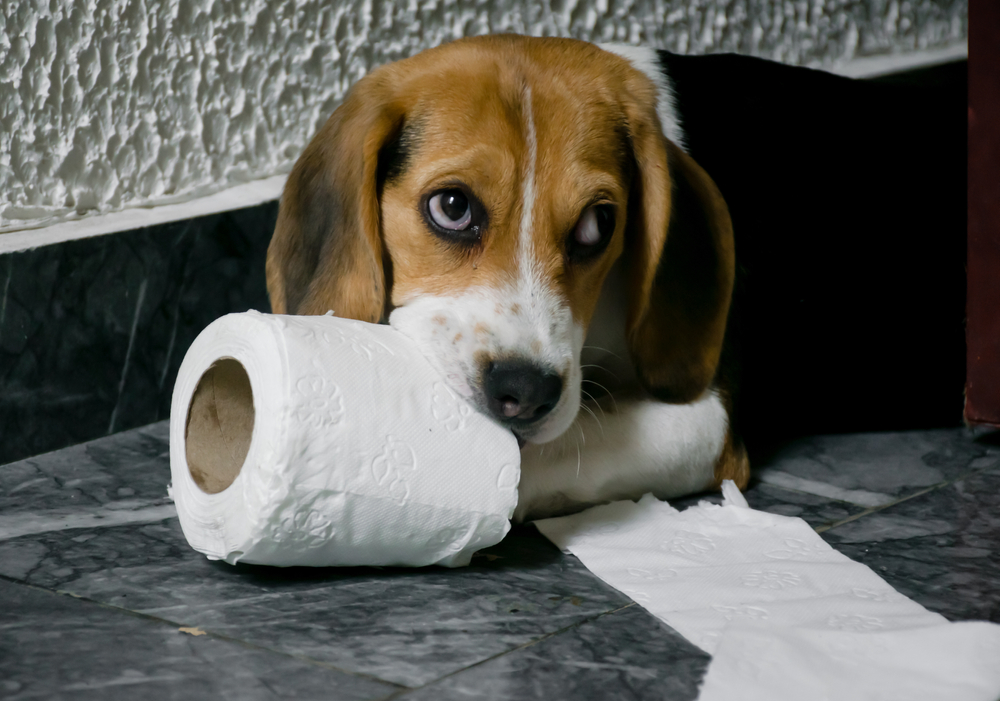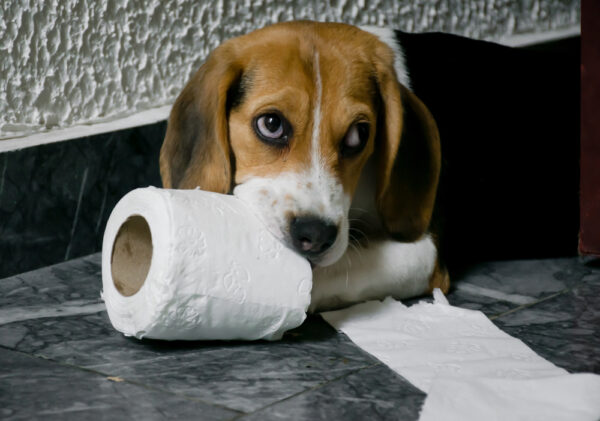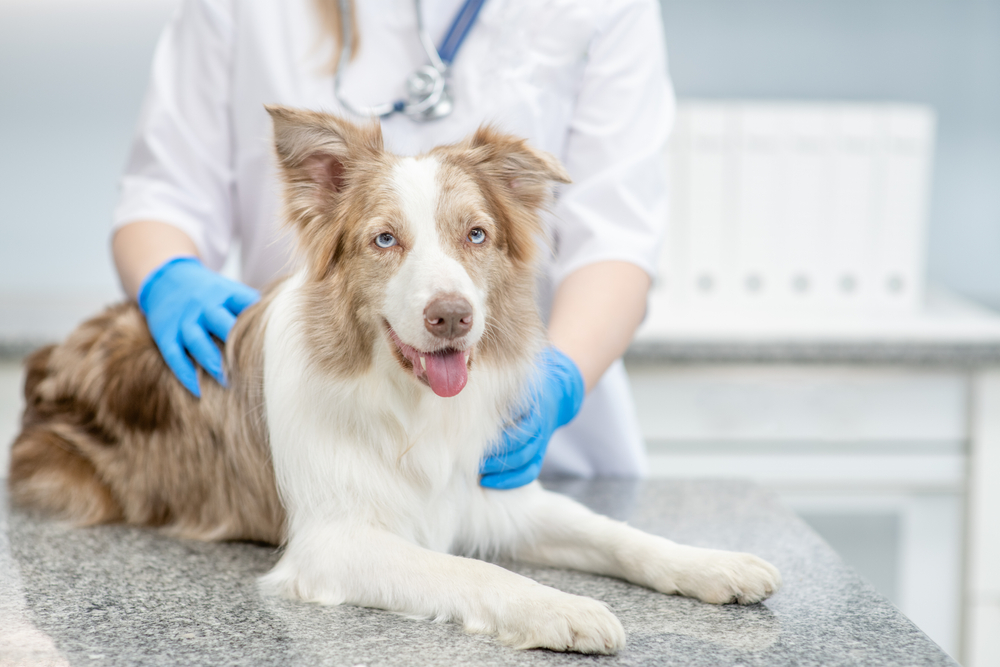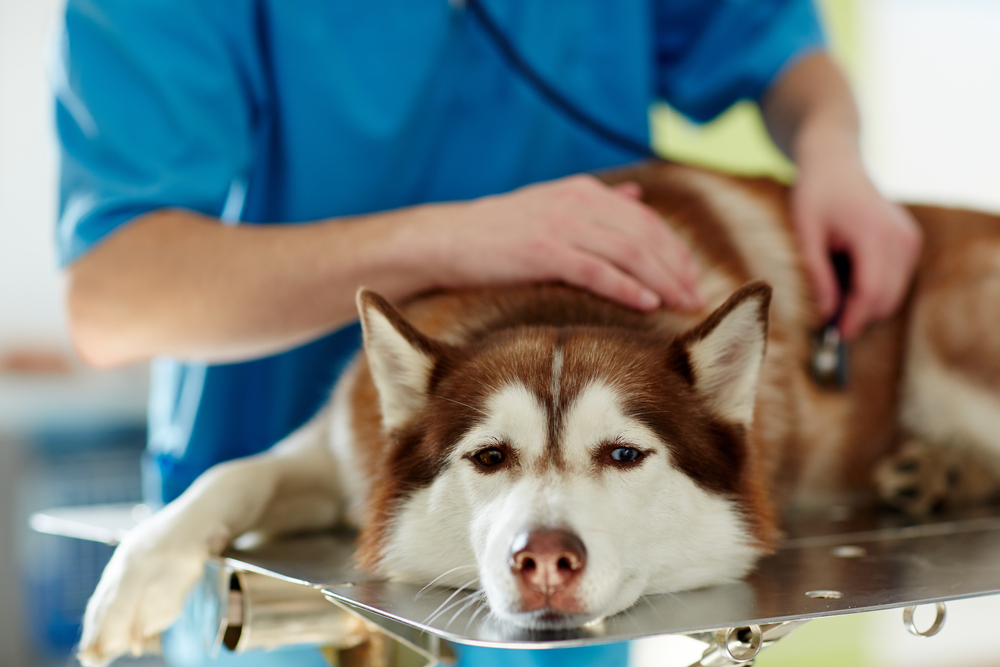Click to Skip Ahead
Compared to felines, canines are known for eating anything and everything that they can get their mouths on. Many dogs live up to this reputation, which is admittedly sometimes kind of gross.
There are several reasons that your dog may like to eat your socks or chew on soil, but we know that these things are not good for them, and a few of the things that they tend to eat can lead to a life-threatening obstruction.
Here, we explain why dogs might eat things that they shouldn’t and what you can do about it. That said, don’t hesitate to take your dog to the veterinarian, particularly if they are eating things that can harm them.
The 5 Reasons the Dogs Eat Things They Shouldn’t
1. Pica
If a dog ingests things that they shouldn’t, especially non-food items, they are experiencing something called pica. Do note that pica only occurs when the dog actually swallows a non-food item and does not just chew on it.
Pica-afflicted dogs can eat any number of things, with some of the most common items being:
- Clothes (particularly, socks and underwear)
- Dirt
- Garbage
- Metal
- Paper
- Plastic
- Rocks
Some dogs might ingest almost any non-food item that they come across, but many will only eat the same thing every time.
It’s believed that pica arises for various reasons, including obsessive-compulsive disorder, poor nutrition or other medical conditions.
Signs of Pica
If you suspect that your dog has been eating things that they shouldn’t, but you’re not entirely certain, there are other signs that your dog might exhibit if they have pica.
The possible signs linked with this condition are:
- Vomiting
- Gagging and retching
- Lack of appetite
- Broken teeth
- Pawing at the mouth
- Straining to have a bowel movement
- Black, tarry feces
- Visible distress
- Excessive drooling
- Abnormal behavior
If your dog shows any of these signs, take them to your vet. They might have an obstruction in their gastrointestinal tract, which needs immediate medical attention!
PangoVet. It’s an online service where you can <b>talk to a vet online</b> and get the personalized advice you need for your pet — all at an affordable price!
</p>
<div class="su-button-center"><a href=https://www.dogster.com/dog-health-care/"https://pangovet.com/?utm_source=dogster&utm_medium=article&utm_campaign=dog_eat_drink%22 class="su-button su-button-style-default" style="color:#FFFFFF;background-color:#FF6600;border-color:#cc5200;border-radius:9px;-moz-border-radius:9px;-webkit-border-radius:9px" target="_blank" rel="nofollow"><span style="color:#FFFFFF;padding:0px 24px;font-size:18px;line-height:36px;border-color:#ff944d;border-radius:9px;-moz-border-radius:9px;-webkit-border-radius:9px;text-shadow:none;-moz-text-shadow:none;-webkit-text-shadow:none"> Click to Speak With a Vet</span></a></div></div></div>"}" data-sheets-userformat="{"2":513,"3":{"1":0},"12":0}"> If you need to speak with a vet but can’t get to one, head over to PangoVet. It’s an online service where you can talk to a vet online and get the personalized advice you need for your pet — all at an affordable price!

2. Boredom or Stress
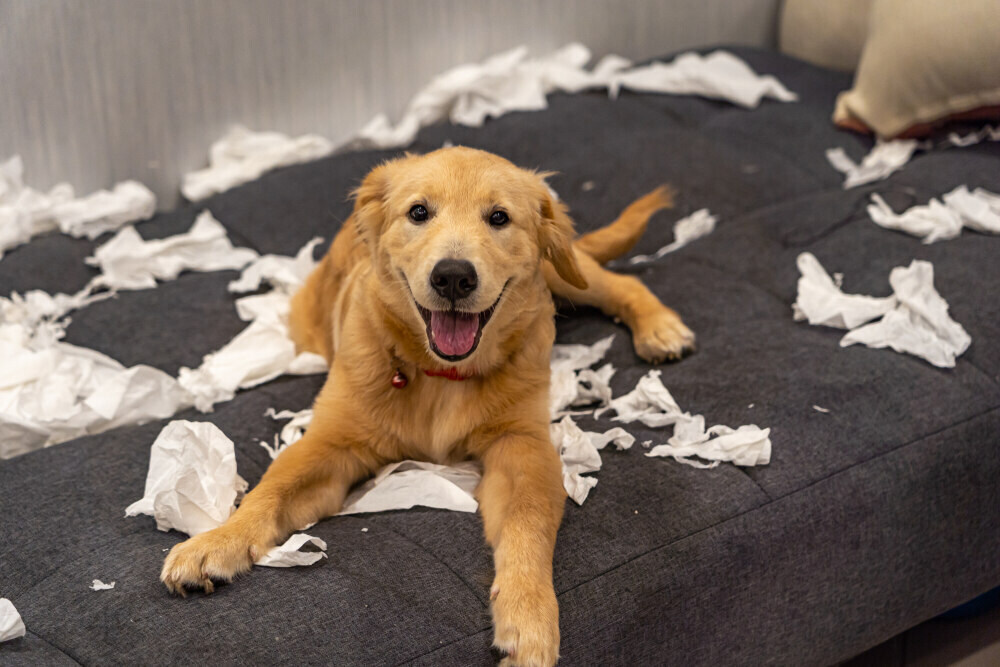
When some dogs are left alone for long periods, they might get bored or stressed, particularly if they are prone to separation anxiety. Canines that suffer from stress and anxiety during thunderstorms, fireworks, or other stressful events might chew on things, which can lead to swallowing the items.
3. Curiosity
Dogs learn about their world using their enhanced senses of taste and smell. During the course of learning about their environment, they might pick things up to chew and sometimes swallow, particularly if it has an appealing odor!
4. Age
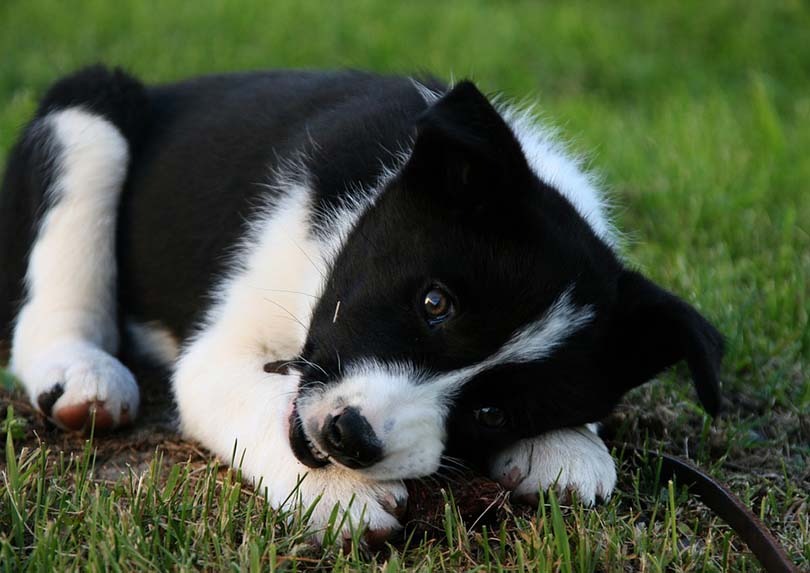
Puppies love chewing everything, which is partly due to teething and partly just normal puppy behavior. Most puppies grow out of this phase, but it’s one reason that you need to puppy-proof your place.
5. Health Conditions
Sometimes, medication for a health condition can lead to excessive hunger, or a health condition will lead to your dog eating things that they shouldn’t. For example, anemia can cause a dog to be low in iron, which often leads to their eating clay, soil, and dirt.
The 6 Ways to Prevent Your Dog From Eating Things They Shouldn’t
This problem behavior needs medical attention before your dog eats something that might lead to surgery or worse.
1. Visit Your Vet
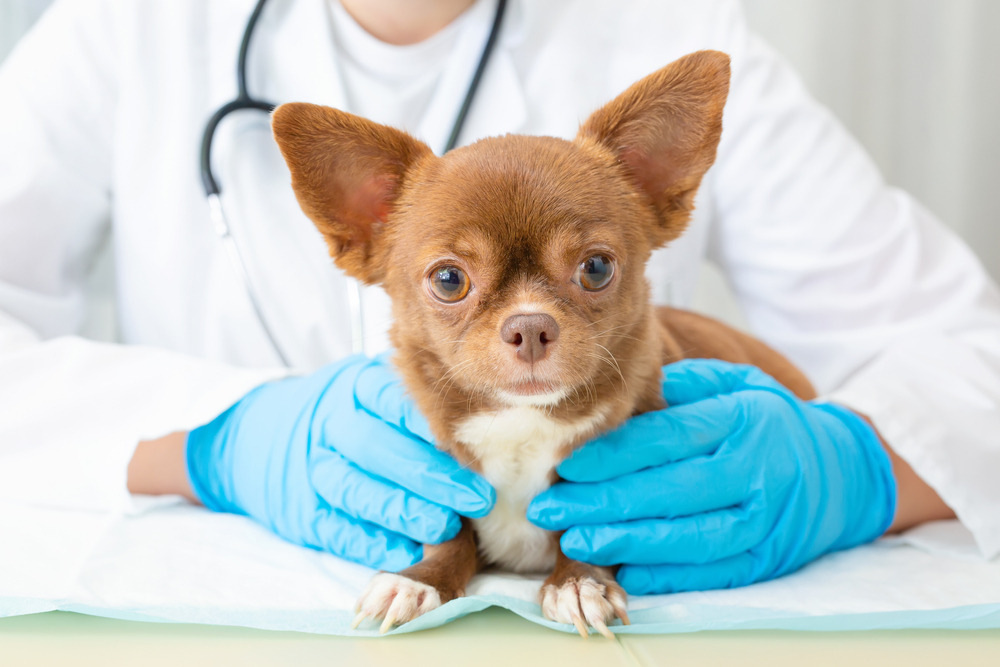
Your first call should be an appointment with your veterinarian to determine if there is an underlying health issue. If it is pica and your dog might have OCD or other psychological issues, you’ll want to contact an animal behaviorist. They will work with you and your dog and will likely use behavior modification and possibly prescribe medication.
2. Train Them
Training is essential! You’ll want to teach your dog to “leave it,” which should be effective at preventing your dog from picking up something that would be dangerous for them to eat. Ensure that you only use positive reinforcement training.
3. Keep Them Active
Your dog should be both physically and mentally exercised. If your pet is eating things because they’re bored, you should increase their physical exercise. Take them out for longer walks, and spend time actively playing with them. Also, think about providing them with things like puzzle toys and treat dispensers that they need to figure out for a reward.
Keeping your dog mentally and physically active can help reduce chewing and eating from stress and boredom.
4. Get Appropriate Chews
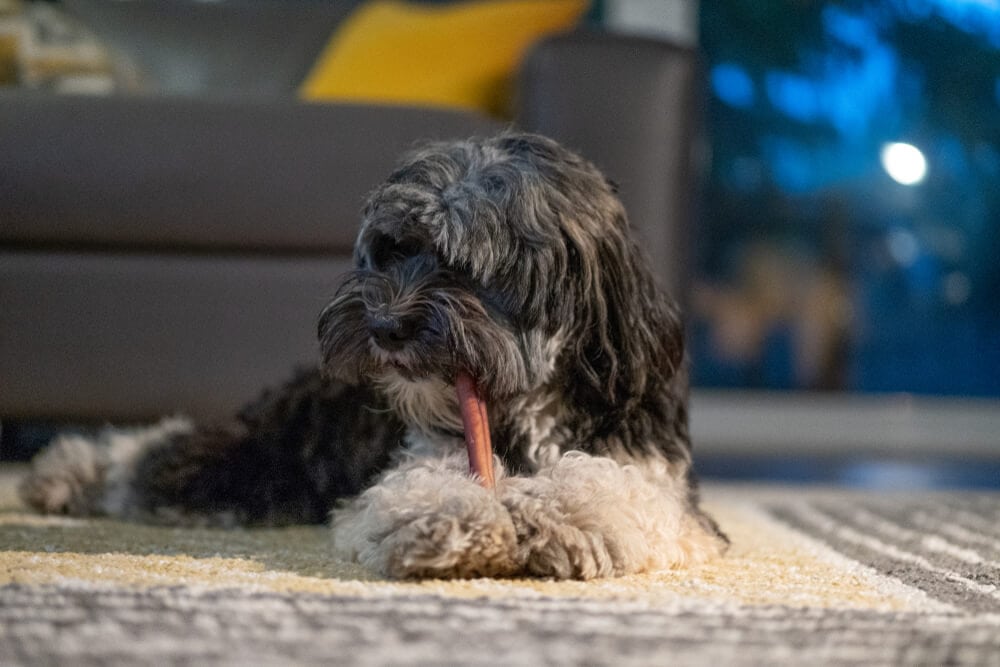
Beyond puzzle toys, ensure that your dog has appropriate chews, which will keep their mouth too busy to eat other things. It’s normal dog behavior to chew, and giving them toys made for dogs will help keep their teeth and gums clean and healthy. Just ensure that you don’t give your dog anything with small parts that might break apart while they’re chewing, such as sticks. This can lead to damage to the mouth and broken teeth and might pose a choking risk.
5. Remove Temptation
If your dog tends to go after specific things, such as your socks, make a point of not leaving them in places where your dog can access them. Put things in drawers and inside closets, and ensure that everyone in your family follows these rules. Remove access to everything small enough that your dog can swallow.
6. Use a Muzzle
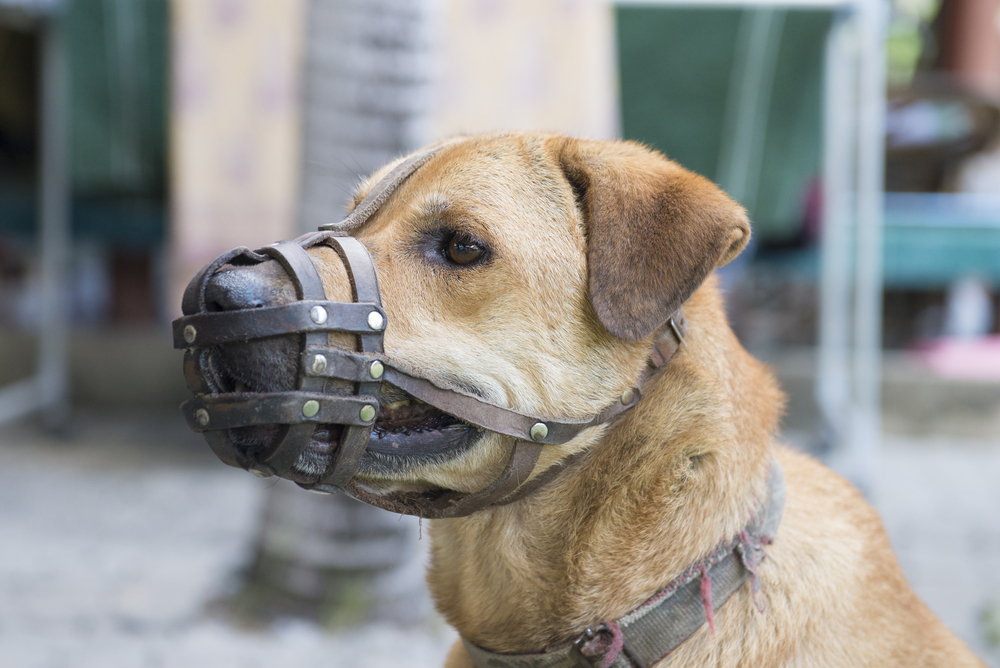
Muzzles are not just for dogs that might have anxiety or aggressive behavior. Many dog owners use basket muzzles to prevent their dogs from eating things while on a walk. You might need to muzzle train your dog first, but you should still keep on top of regularly training your dog, as that’s a better method to stay on top of the problem behavior.

Conclusion
Sometimes dogs might eat something that we think of as inedible, like grass and poop, but they might not necessarily have pica. You should speak to your vet when your pet starts to eat things that can pose a danger. Get an animal behaviorist involved too, as they will be able to help.
Don’t forget to pick up around the house and get your family involved. You all must be on the same page to help keep your dog safe.
See Also:
- Why Do Dogs Eat Tampons? Vet-Reviewed Reasons & What to Do
- Catnip for Dogs: Vet-Verified Effects, Safety & Alternatives
Featured Image Credit: Viktorija Nikic, Shutterstock

